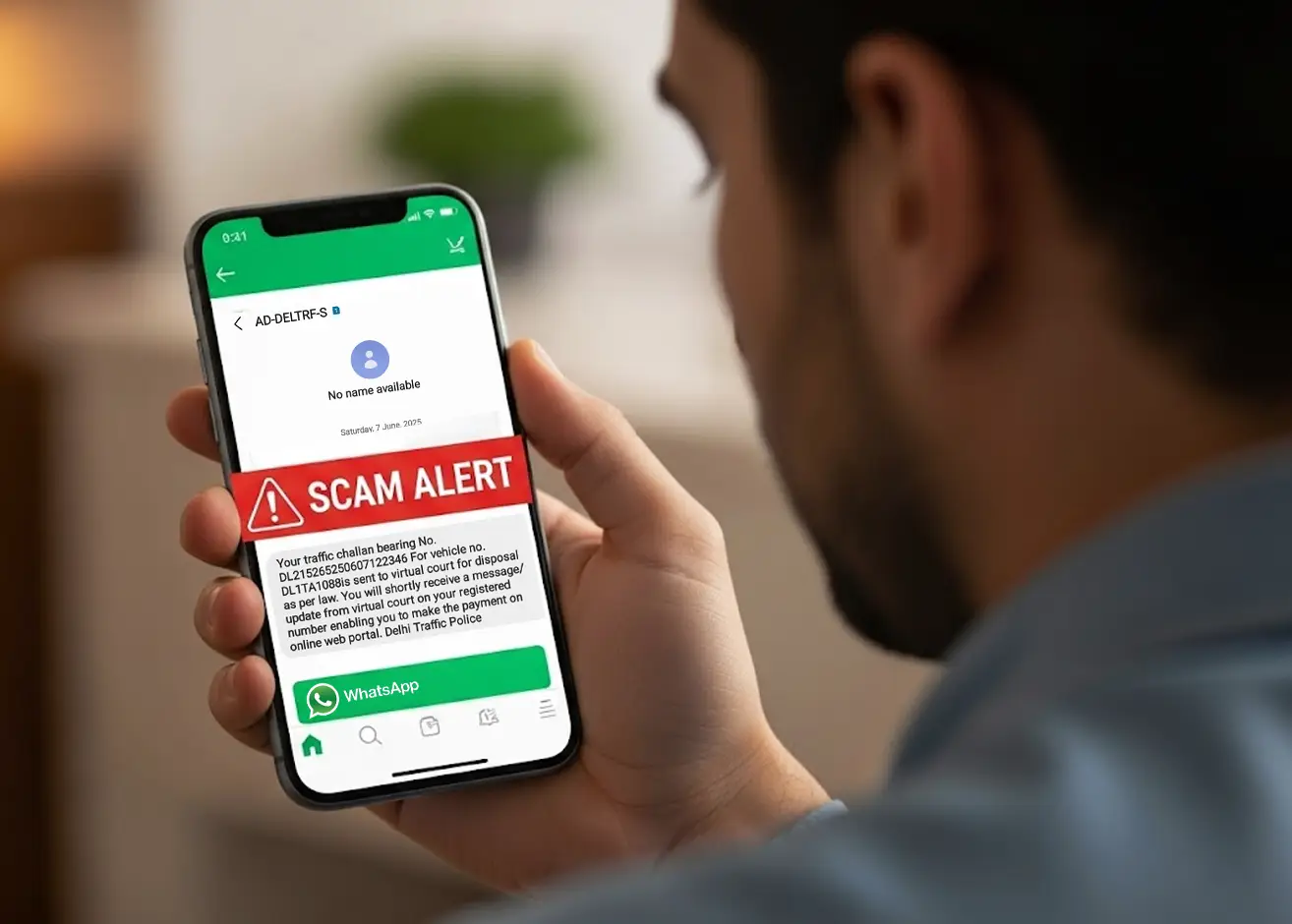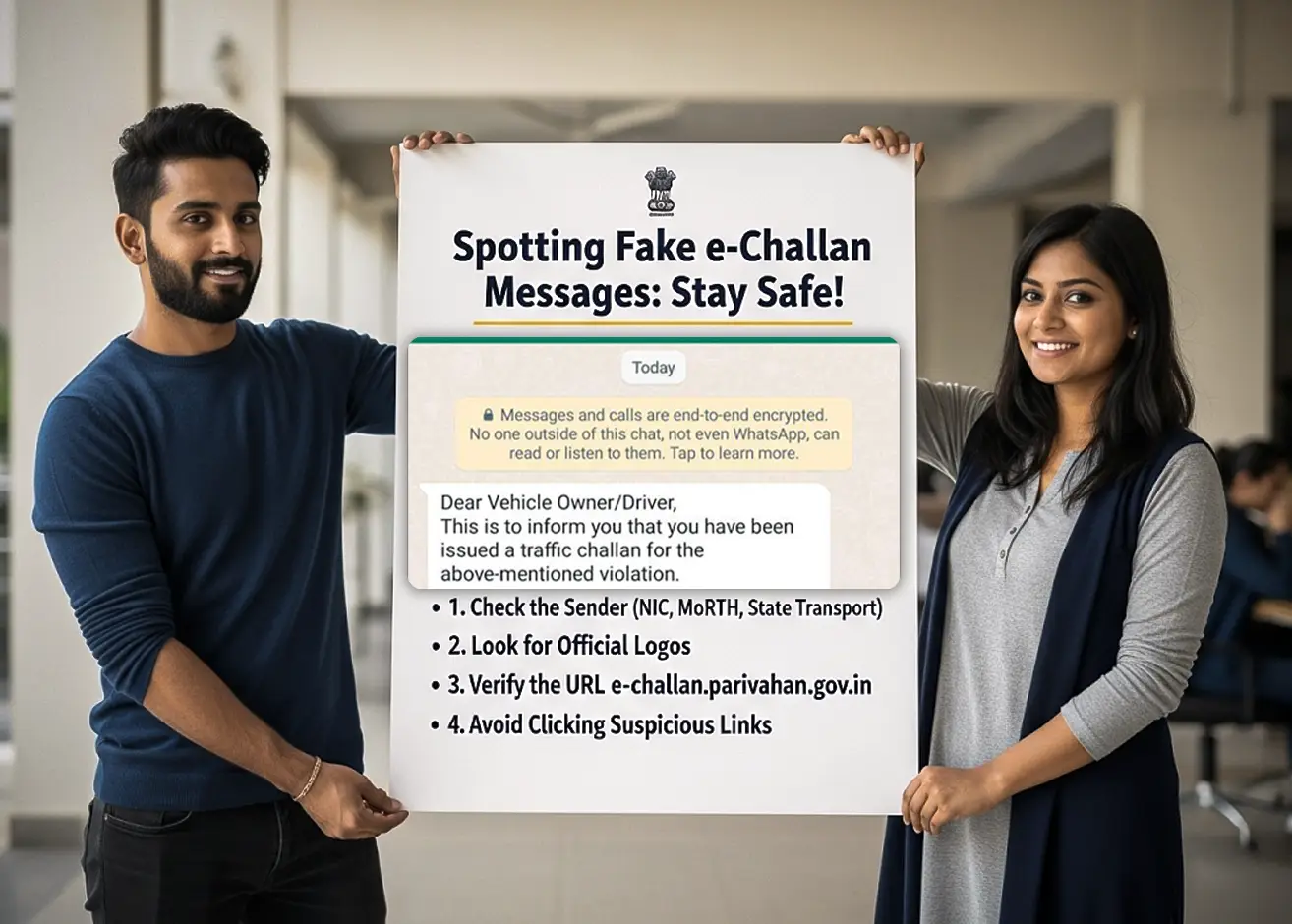

Traffic Challan Scam Alert 2025: Fake E-Challan Messages, WhatsApp Links & How to Stay Safe
- 1Fraudsters are using fake messages to steal financial and personal information
- 2Messages sent via email, SMS, or WhatsApp are structured to sound authentic
- 3Take preventive measures and steer clear of unknown numbers and suspicious links
If your phone vibrates with an unexpected e-challan message, do not panic, but you also should not click. The rise of the traffic challan scam 2025 is putting vehicle owners across India at risk. Scammers are sending fabricated WhatsApp messages, malware applications, and phishing links that appear official but have malicious intent. Their goal is to make people pay fines that never existed while obtaining personal and banking data.
These scams are not small and harmless pranks. Messages usually mimic government portals, logos and official formats, and they create a sense of urgency that can make anyone click without thinking and people have lost a lot of money. Continue reading as we go over how the traffic challan scam 2025 works, how to identify it, and the easy steps to check traffic challan online so that you can save yourself and your money before it’s too late.
What are the Common Techniques of the Traffic Challan Scam 2025?

Fraudsters use different methods to ensure the fake e-challan messages sound authentic. Here are some common ways:
1. Links
Messages contain links redirecting customers to fake websites that mimic official portals such as Parivahan Sewa. Once they enter personal information such as bank account numbers or credit/debit card details, along with OTPs, the data is captured by hackers.
2. Emails and SMS
Fake email addresses and SMS numbers are created in such a manner that they look like official ones.
3. WhatsApp messages
Scammers send e-challan messages with payment links or QR codes, which are often accompanied by subtle threats about impending legal consequences if the payment isn’t completed immediately.
4. Fake calls
Traffic challan scam 2025 even involves calls where hackers pose as traffic police and inform you about a particular traffic violation. They emphasise paying the fine urgently and try to force you to click the link sent via a message.
5. Malware
Another way the traffic challan scam 2025 works is by sending emails to users with attachments of e-challan copies. However, these are malware, and once you click on them, they compromise the data and information on your device.
Traffic Challan Scam Alert 2025: Real-Life Incidents
- Vadodara Incident: A businessman lost ₹34.75 lakh after installing a malicious app called RTO e-challan.apk, which he received through WhatsApp. The application jeopardised his banking details, which resulted in unauthorised transactions.
- Nashik Case: A man was a victim of a fraudulent RTO challan SMS and ₹6 lakh was stolen out of his bank account. The fraud was done by the malicious APK file that was able to remotely access his phone.
- Coimbatore Reports: Several residents have been getting scam traffic challan messages on WhatsApp, which ask them to download fake applications. One of them lost as much as ₹2.96 lakh.
- Rajkot Incident: A shop owner fell into a trap and downloaded a traffic challan app that turned out to be fake and he lost ₹10.81 lakh. The app accessed his sensitive banking data, which resulted in the loss of money.
- Kochi Arrests: Two suspects were detained on charges of spreading the counterfeit Parivahan apps through WhatsApp. The fraud was to gather information about vehicles with the help of a Telegram bot and rob the financial records of victims.
How to Stay Safe from Traffic Challan Scam 2025?

Here is your blueprint to dodge these scams easily and stay safe:
Always Verify Through Official Channels
Never open links in messages. You can check the challan online instead by simply going to the Parivahan Sewa portal or the official website of your state RTO. Legit portals provide you with the right and relevant information without jeopardising your information.
Ignore Urgent Payment Messages
Authentic challans do not pose the risk of impounding your vehicle in case you do not pay immediately. When a message implies that it is urgent, then it is likely to be a scam. Wait, check and do not hurry to make the payment.
Say No to Random APKs or Apps
When someone tells you that you need to download a traffic challan app through WhatsApp or Telegram, do not do it. These applications are malware in disguise, they can steal banking data and personal files. Install only verified apps from Google Play Store or App Store and check the ratings.
Report Suspicious Messages Immediately
Make it a habit of reporting phishing/scam messages to the Cyber Crime Portal. The more these scams are flagged, the faster authorities can respond.
Spread Awareness
Share information with friends, family and colleagues. A single warning forwarded can save another person from being the victim of the traffic challan scam 2025.
Step-by-Step Protection Guide
Here is a fail-proof routine to protect yourself from such scams:
- Weekly Reminder: Set a reminder to check traffic challan online on a weekly basis to never be caught off guard.
- Verify Before Paying: Cross-check any e-challan message with RTO websites.
- Be Smart with Bank Alerts: Leave SMS/email alerts enabled on transactions, so that any unusual debit can be reported instantly.
- Device Security: Ensure that you have the latest phone OS and have an effective antivirus program installed to prevent malicious apps.
- Educate Your Circle: Ensure that all the people in your home or workplace are aware of fake messages and links.
Your Quick Action Checklist
Here is a simple checklist covering the important points mentioned in this blog that you should always follow to stay safe from the traffic challan scam 2025:
- Always verify challans through official portals.
- Never download apps from WhatsApp or unknown links.
- Ignore messages that pressure you to pay immediately.
- Report suspicious activity to authorities.
- Educate your friends and family, as knowledge and awareness is your best bet.
Summary
Whether it is a fake WhatsApp message or malicious APKs posing as official apps, scammers are always trying to come up with new methods of stealing personal information and emptying bank accounts. What makes it worse? They are official-looking, urgent-sounding, and they exploit our fears.
But here’s the reality: staying safe is not complicated. The moment you make it a habit to check traffic challan online using the official portals, avoid clicking on unknown links, and never download random apps, you are already far ahead of these fraudsters. The takeaway is simple: don’t rush, don’t click, and always verify. Inform friends and relatives about it, remain vigilant, and you will be able to enjoy digital traffic services without falling into traps.
Frequently Asked Questions
Expand all





























.jpg&w=828&q=75)


